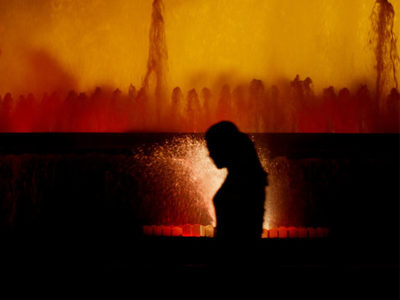IT’S THE QUESTION OF THE WEEK.
It comes from Ricardo Garcia-Suarez, who wins a free book of mine for his troubles (Ricardo, email me).
Here’s his question. It’s kinda long, which suggests Ricardo might be a candidate for the ministry.
I’ve heard people (who call themselves Christians) say that they would rather go to hell to be with their family than go to heaven and be without them. But doesn’t the book of Revelation say that hell will be a dark pit? Wouldn’t those in hell be unable to recognize their loved ones? What would be the most accurate biblical description of hell?
First of all, Ricardo, I can fairly safely say that those folks who suggest it would be better to go to hell to be with our family have not met my family.
Most of the people I know in my extended family are heavenly souls. Some, however, are hell on earth. If they’re going to heaven, I’d like to know the temperature in hell.
I measure my tradeoffs.
Now to the heart of your question, which you saved for your last sentence—just like a preacher would do. A Bible scholar, too. (Journalists like the good stuff first.)
What’s the most accurate biblical description of hell?
Here are a few descriptive lines from the Bible.
- “God…can destroy both your body and your soul in hell” (Matthew 10:28 CEV).
- “…the unquenchable fires of hell” (Mark 9:43 NLT).
- “… hell, where the maggots never die and the fire never goes out” (Mark 9:47-48 NLT).
- “He sent them to hell and put them in caves of darkness” (2 Peter 2:4 NCV).
To many Christians, it sounds kinda tough to take those lines literally.
- The fire is burning but the cave is dark?
- The fire never goes out, but the lights go out in our body and soul?
- And what’s up with the maggots in hell? Who knew maggots had a soul?
Here’s what some Christians I know would offer as the short answer to your question, Ricardo—the most accurate biblical description of hell:
I am convinced that nothing can ever separate us from God’s love. Neither death nor life, neither angels nor demons, neither our fears for today nor our worries about tomorrow—not even the powers of hell can separate us from God’s love.
Romans 8:38 NLT
For the long answer, here’s a link to a blog post of mine about it last year: A day in hell.
And here’s what you’ll find about hell in my recent release, Illustrated Bible Dictionary:
HELL IS AN ENGLISH INVENTION. It’s an attempt to translate the symbol behind a location we can plot on a map: Hinnom Valley, just outside the walls of Jerusalem.
Whenever Jesus used the word hell, he was saying the name of that valley. Replace hell with the Hebrew word, “Hinnom,” or with the Greek version, “Gehenna.”
That doesn’t mean hell is only a valley on the outskirts of Jerusalem. For Jews, that valley came to symbolize God’s judgment. Jewish kings used to sacrifice humans to idols in that valley. Sins like that, the prophets explained, are why God let Babylonian invaders in 586 BC swarm in from what is now Iraq to destroy Jerusalem and deport the Jews—wiping the Jewish nation off the map.
Jews linked Hinnom Valley and God’s judgment the way Americans link 9/11 to the terrorist attack on September 11, 2001.
Jesus painted graphic word pictures of hell:
- “unquenchable fires” (Mark 9:43)
- “prepared for the devil and his demons” (Matthew 25:41)
- with plenty of room for sinners, religious hypocrites and any other “Snakes! Sons of vipers!” (Matthew 23:23).
The trouble with hell
Many scholars seem troubled by the traditional teaching about hell—that’s it’s a place where sinners will be tortured forever. Here’s why.
Torture isn’t God’s MO. These Bible experts say that when God punished someone in the Bible, he had a redemptive reason. Even the fall of Jerusalem in 586 BC was intended to eventually turn the Jews back to God. They say that eternal torture sounds more sadistic than redemptive.
Jesus often spoke in symbols. Some wonder if the teacher who spoke of camels trying to walk through the eye of needle was using the same style of metaphor when he described hell.
A few creative theories
Scholars offer theories like these about hell.
It’s fiery hot. Sinners will burn, feeling the pain forever.
It’s God’s cold shoulder. The torment is being separated from God—the divine cold shoulder. Forever.
It’s annihilation. Fire symbolizes destruction. After the death of the body comes “the second death” (Revelation 20:14). The death of the soul. It’s the destruction that lasts forever, not the suffering.
It’s temporary. Think parole. In time, everyone is reconciled with God. One go-to verse: “All the broken and dislocated pieces of the universe—people and things, animals and atoms—get properly fixed and fit together in vibrant harmonies, all because of his [Jesus’] death, his blood that poured down from the Cross” (Colossians 1:20 The Message).


Leave a Reply